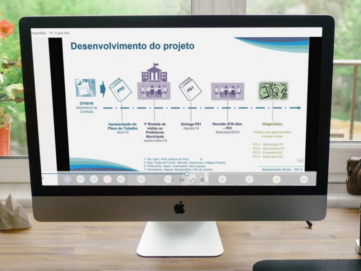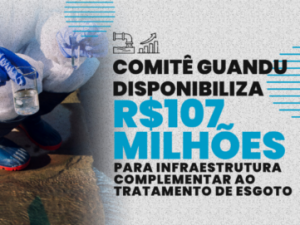The Committeeê Guandu-RJ held the second ordinary meeting of the Plenary this Thursday (27). The result of the Rural Sanitation project was presented, an initiative that diagnosed the needs for sanitary sewage and elaborated the basic and executive projects for the rural and peri-urban areas – that mix rural and urban – of the basin, with the best environmental and economic options. The meeting also marked the approval of the Sanear Guandu program, which guarantees investments in sanitary sewage in priority areas of the basin, and the resolution that consolidates the Payment for Environmental Services program ( PSA).
The Rural Sanitation project, which began to be developed in 2019, is; an achievement of the Committee Guandu-RJ, with the execution of the Profill/TSA consortium, with supervision and management by AGEVAP, and follow-up by the technical follow-up group of the Committee; formed by members and technicians from the municipalities. The engineers joined the National Rural Sanitation Program to develop the project. The basic and executive projects serve the fifteen municipalities in the basin, around 19,500 households. It is a population of approximately 73 thousand people who generate about twelve million liters of sewage per day. 77 sewage treatment plants and nearly 15,000 individual solutions were designed. The alternatives took into consideration the environmental, social and economic aspects, divided into collective and individual solutions. The goal is; give the correct destination to the sewage, which most of which drains into the Guandu River, a source that supplies about nine million people in the Metropolitan Region of Rio de Janeiro. “One of the hallmarks of this project was the mobilization. The team had a sociologist and in addition to visits to municipalities and on-site diagnosis, we took all the data for the analysis of the local administration, in order to arrive with more accuracy. ;the à reality”, stated during the project presentation the Civil Engineer Carlos Bortoli, Director of Profill Engenharia.
Mario Luiz Dias Amaro, Secretary of the Environment of Piraí and member of the Committeeê Guandu-RJ, reinforced the work of mobilization. “In Piraí, for example, the team was accompanied by technicians from the environment, works and agriculture department. This union was fundamental for the assertiveness of the project”, he said.
For the agglomerates, the collective solutions were septic tanks with biological filter by gravity, so that there is no expense with pumps and other devices, avoiding the needs and costs of operation; . Already; for the individual solutions, eleven alternatives were structured. All of them take into account the study of the soil, the presence of water resources in the land, technical feasibility, economy and the preference of the residents, among other things. The alternatives cost between four and eight thousand reais and can be implemented in up to; four days, no operation required. A circle of banana trees and a biodigestor cesspool – Embrapa technology – were some of the alternatives pointed out.
In order for the projects to correspond to the social and health reality, those responsible for the health centers were also the sources of consultation. “We collected information from the local health sectors and from the population itself so that we could find the best solutions, thinking about the benefits of complete sanitation.” Carlos Bortoli. The projects were designed so that city halls could claim resources from other sources for their execution. However, with the approval of the Sanear Guandu program, around sixty million reais will be invested in hiring companies to implement the structures. With this investment, the Comitê hopes to improve the water quality of the Guandu River, which supplies about nine million people.
Another approved program was Sanear Guandu. In practice, it prescribes; investments in sanitary sewage in the areas responsible for the largest discharge of sewage in the basin that supplies 150 districts of Rio de Janeiro and nine more municipalities in the Baixada Fluminense. Prioritizes this was carried out after studies guided by the Committee’s Strategic Plan for Water Resources. The main area is; the hydrological planning unit six, which encompasses the Poços, Queimados and Ipiranga rivers. Together, these rivers dump around 22 Olympic pools of sewage into Lagoa do Guandu a day, there are now; few meters from the catchment of the CEDAE Water Treatment Plant. These investments include the implementation of the structures provided for in the Rural Sanitation project, among others also aimed at urban sanitation.
The meeting also marked a new phase in the Committee’s Payment for Environmental Services (PES) program. Currently, the Water and Forest Producers (PAF) program develops actions for forest conservation and restoration, in addition to the PSA. The initiative already; resulted in the conservation and restoration of more than five thousand hectares of Atlantic Forest and only; last year, it financially repaid almost half a million reais to the participating producers, for the environmental services rendered à basin.
With the new design, the PAF will not only value conservation and promote forest restoration, but also will; encourage land use change by converting areas of low productivity into systems with greater eco-hydrological and economic functionality.
The program will work; in biannual cycles, that is, every two years, public selections will be opened for contracting environmental service providers, divided into two modalities: annual PSA, which includes conservation modalities Restoration, passive restoration and active restoration and; the PSA Financial Support, which will be granted to the rural owner for the acquisition of the necessary inputs à implementation of productive conversion, which includes agroforestry, silvopastoral, managed forest and conservation practices. The resolution has been passed and is now; it is in force.
New organizations became part of the composition of the Collegiate. UEZO, ASDINQ, TERNIUM, FAB Zona Oeste, State Secretariat for Civil Defense and FIPERJ signed up for vacancies, complied with the requirements of the last electoral process and were approved by the Plenary.
The Collegiate will now go; deal with the implementation of the initiatives. The next regular meeting of the Plenary is in progress; scheduled for the 26th of August.
COMMUNICATIONÇÇTHE COMMITTEEÊ GUANDU
Telephone: (21) 3787 3729
E mail: comunicacao.guandu@agevap.org.br




